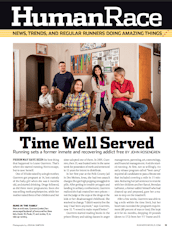PRISON MAY HAVE BEEN the best thing that happened to Leane Guerrero. That’s where she started running. Not to escape, but to save herself.
One of 10 kids raised by a single mother, Guerrero got pregnant at 14, lost custody of the baby girl when she was 6 months old, and started drinking. Drugs followed, as did three more pregnancies. Soon she was selling methamphetamine, while her mother raised three of her children and her sister adopted one of them. In 2005, Guerrero, then 23, was busted twice in the same week for possession of meth and sentenced to 12 years for intent to distribute.
In her first year at the Polk County Jail in Crookston, Minnesota, she had two assault charges. She got high popping smuggled-in pills. After getting in trouble yet again and landing in solitary confinement, Guerrero realized she had created her own prison—not the judge or the cops or the drugs or the kids or her disadvantaged childhood. She resolved to change. “I didn’t want to live the way I had been anymore,” says Guerrero, now 32. “I vowed to make myself better.”
Guerrero started reading books in the prison library and taking classes in anger management, parenting, art, cosmetology, and financial management. And she started running. At first, not so willingly. An early release program called “boot camp” required all candidates to pass a fitness test that included covering a mile in 15 minutes. Reducing her jail sentence to reunite with her children and her fiancé, Brendan LaFrance, a former addict himself who had cleaned up and proposed, gave her a reason to step on the treadmill.
After a few weeks, Guerrero was able to log a mile within the time limit, but her heart rate exceeded the program’s requirement (80 percent of max or less). She kept at it for six months, dropping 20 pounds (down to 172) from her 5’1″ frame and finally qualifying for boot camp, only to have her request denied based on her prior conduct issues.
Guerrero pounded her frustration into the treadmill, running for the entire 50-minute block of exercise time allotted almost daily. Running gave her an opportunity to set goals and gain a sense of accomplishment. It gave her a chance to clear her head, which granted her the serenity she’d tried to find with drugs but never could.
After 18 months, Guerrero was accepted into the early release program, where she and two other women petitioned their captain to be able to run on an outdoor track that was not fenced or walled-in. He eventually gave in on the condition that they could prove themselves serious by running two miles. They ran five.
Guerrero dropped more weight, gained confidence, and began to glimpse that rarest of commodities in prison: hope. “Running wasn’t something I always necessarily enjoyed,” she says, “but I enjoyed what running did for me.”
After nearly five years in prison, in September 2010, Guerrero was released. Three weeks later, she ran her first 10-K.
She married LaFrance, and they bought a house in Moorhead, Minnesota, to raise her kids, who are now 10, 11, and 17. She completed her cosmetology training and now runs the barbershop LaFrance opened in nearby Fargo, North Dakota. She also enrolled in Minnesota State University, where she is working toward a bachelor’s degree in sociology and criminal justice and an eventual licensure in alcohol and drug counseling. Her goal is to help others who struggle with addiction.
And still she runs. In the three years since her release, she has completed 22 races, including five marathons. The medals hang in her living room. Her race numbers are tacked to a bulletin board, reminding her of how far she’s come: Seven years clean and sober, no longer an absentee mother, 50 pounds lighter, now on a path with purpose. “Running has completely changed my life,” she says.
The convicted felon–turned–running enthusiast has also inspired those around her. She’s encouraged her older sister, her husband, and her kids to run—each one has completed at least a 5-K. “I’m very proud of her,” says Leonor Guerrero, Leane’s mom. “She has come a long way.”
Indeed, Guerrero now juggles school, family, work, and running. Naturally, she has stressful days, but that’s okay. “There is no perfect life,” she says. “No one is going to be happy all the time. But to be where I am—sober, healthy—I’m grateful.”
© John Rosengren
